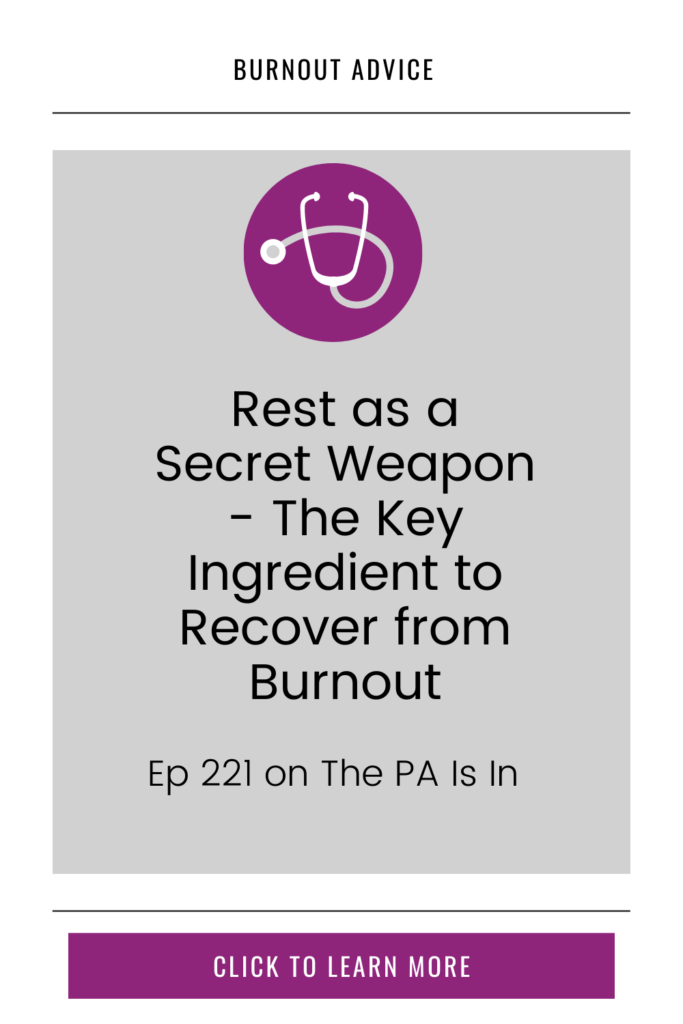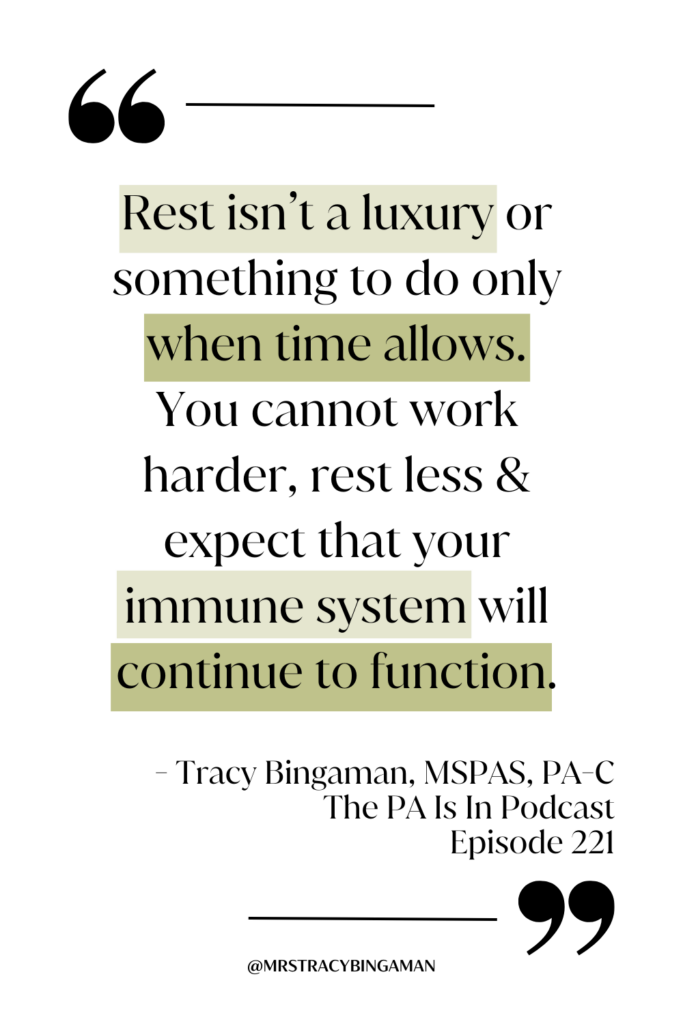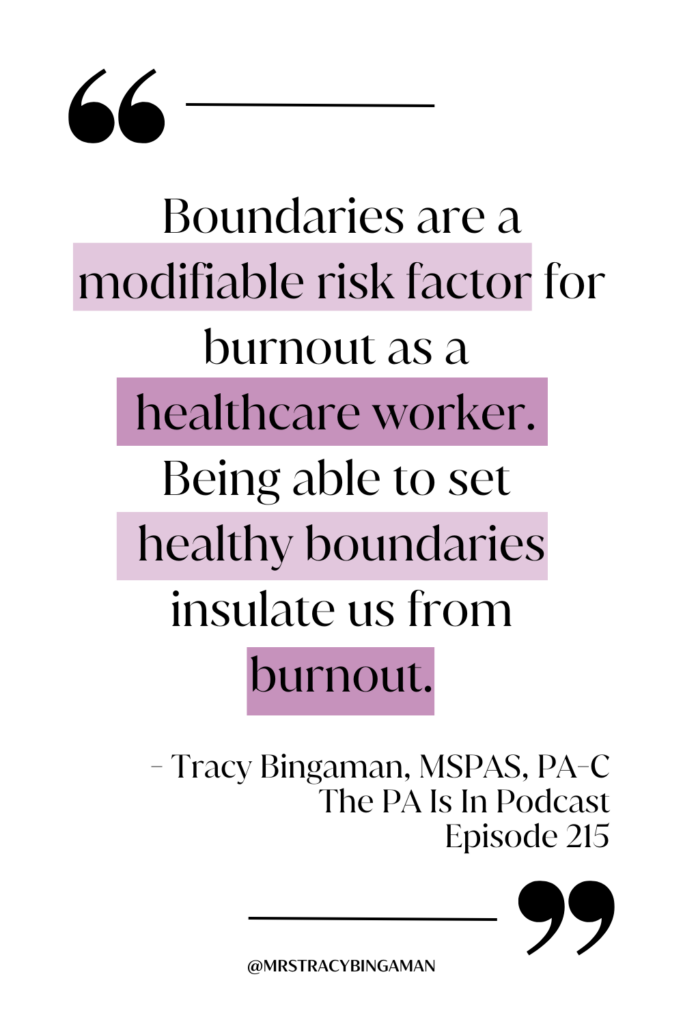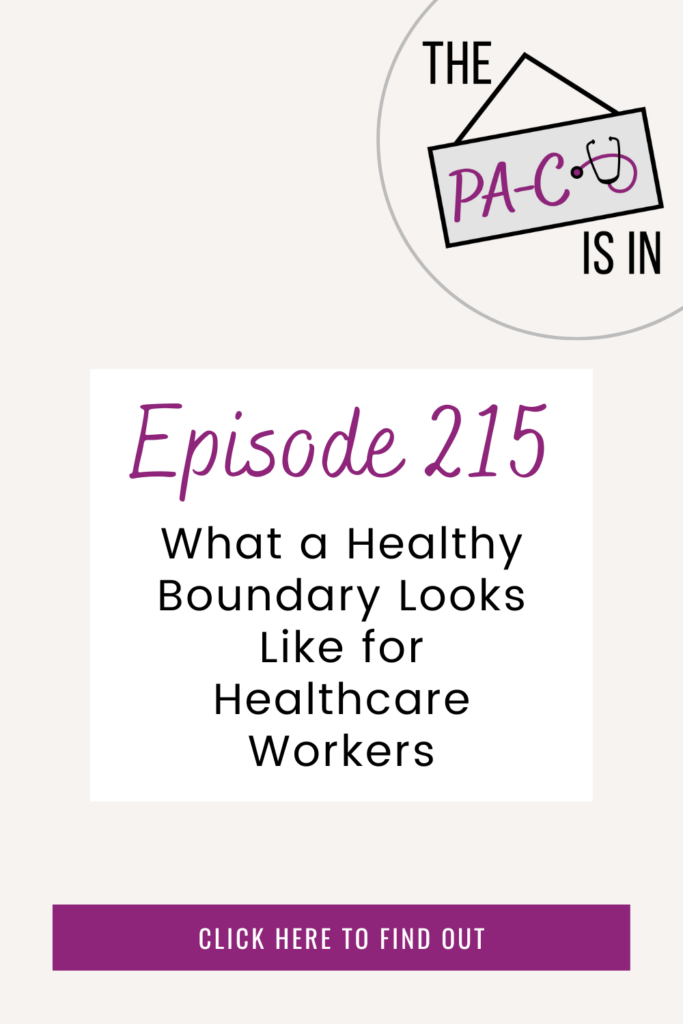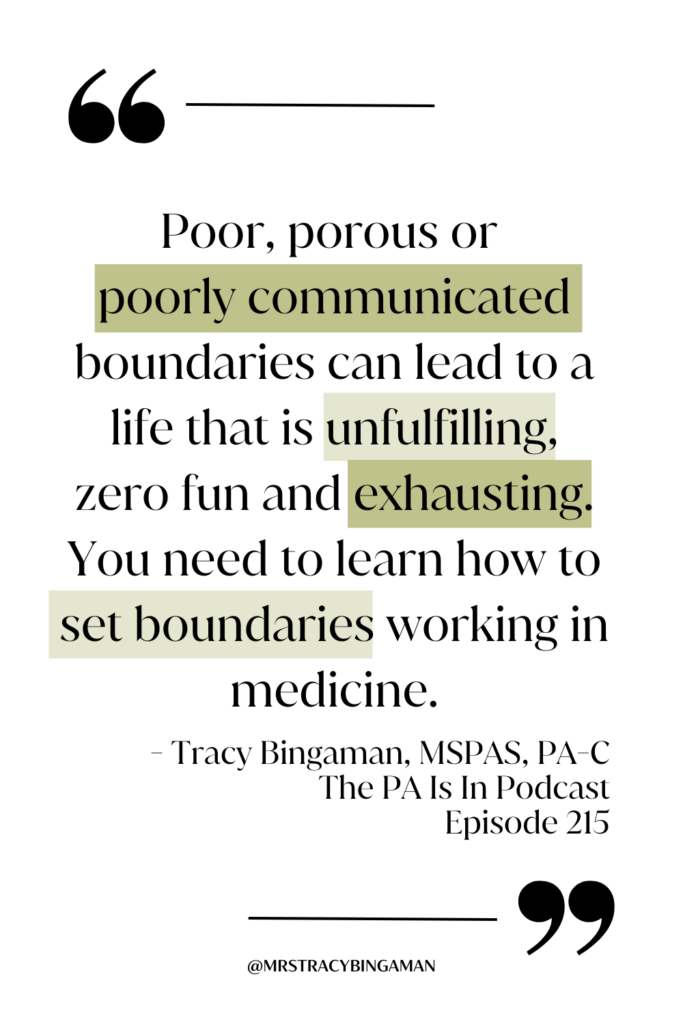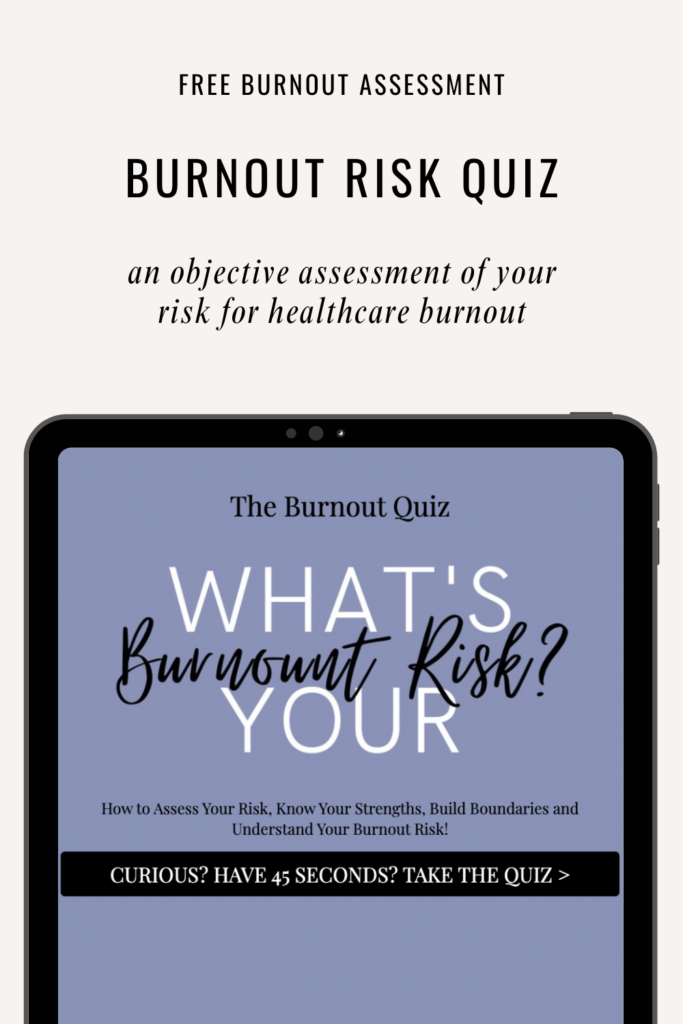
I believe, deep in my heart, that boundary setting should be a clinical skill. Boundaries are not something that come naturally to the achievers that healthcare attracts. We should learn more about it in school. It’s necessary for living a life that feels good and it’s also crucial to thriving in clinical practice.
With healthcare in this customer-service, survey focused, pay-for-patient-satisfaction world that it is right now, being able to set boundaries that are effective is vital.
Watch on YouTube

Boundaries, Defined
So, what is a boundary anyway?
Boundaries are limits, policies, and guidelines of how we run our lives. They dictate what we say yes to and where we reply with no. Boundaries are so important for our physical, mental, emotional and spiritual well being.
I’ve learned a lot about boundaries in the nearly 3 years since I burned out. I’m not saying that boundaries alone would have or could have saved me from crashing and burning when I did, but they certainly would have slowed the process down.
For that reason, I like to think about boundaries as a modifiable risk factor. They are something without our control that we can use to define what is ok and what is definitely Not OK in our interactions.
This applies to interactions with patients, colleagues, leaders in our organization, administration, friends and family members.
Boundaries serve to protect our time and energy, preserve our self-respect, help us to communicate our needs and give us some peace in our lives.
Not having boundaries or having boundaries that are poor, porous or poorly communicated can lead us to overcommitment, stress, burnout and a life that doesn’t have a drop of fulfillment in it.
Not yet convinced as to why you need boundaries in your life?
Studies have shown that boundaries lead to healthy relationships, decreased stress and an increase in your self-worth.
Healthcare and your administrative team will make you feel like you are nothing but a cog in a wheel. One pieces of a bigger machine that doesn’t need you. Replaceable. Disposable.
I’m here to tell you otherwise. Boundaries help to preserve your individuality and remind those around you of who you are and the value you add to your organization.
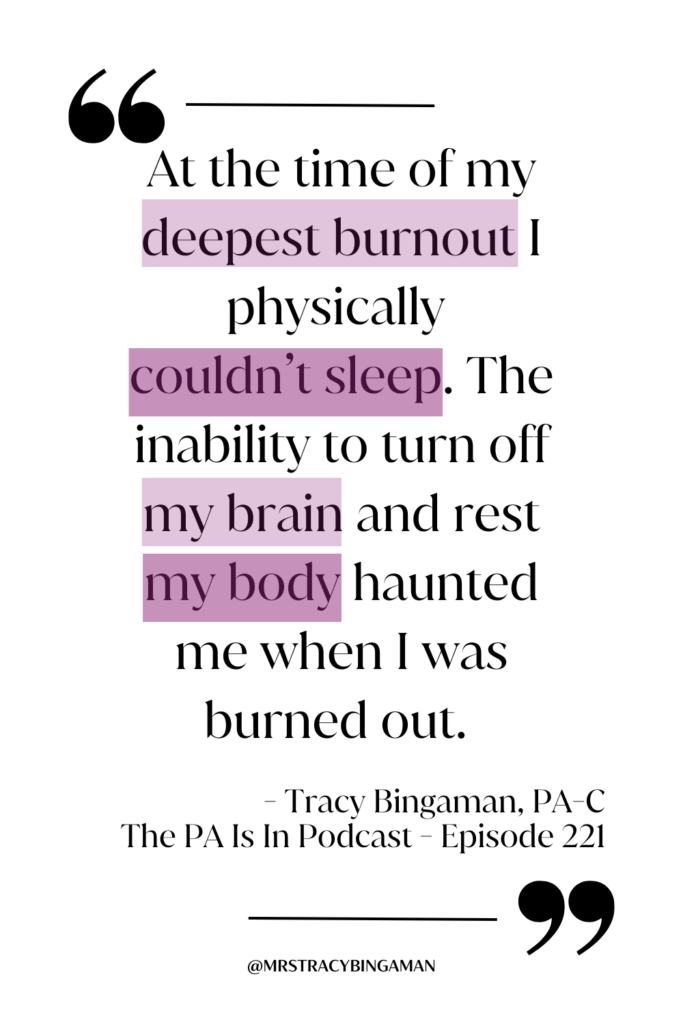
Healthy Boundaries
I’m willing to bet that you’ve made a series of unhealthy or ineffective boundaries in your life in the past.
These are those boundaries that exist only in your mind. The ones that weren’t clearly communicated to others. Boundaries that you decided were true without putting in systems to support them.
Here’s an example of an imaginary, unhealthy, essentially non-existent boundary:
You decide, out of the blue, after a particularly frustrating month where you’ve been charting several hours in the evenings at home on YOUR TIME that you are no longer going to chart outside of work hours.
You come to this decision rashly, after your spouse, partner or family give you push back about being zones out, typing away on your keyboard on the couch instead of being engaged in family game night.
You tell no one about this plan to stop charting outside of work hours – not your schedulers, nurse and clinical support staff, or your spouse or kids. In your mind you’re like “I’ll show them” and off you go.
The problem with this boundary is that there’s nothing in your workflow or schedule to support it becoming a reality. You didn’t adjust the amount of patients you are seeing in a day or work to improve your charting efficiency. By not communicating this to your office manager or team, no changes were made.
This boundary doesn’t exist outside of your own mind and therefore it doesn’t exist at all.
In my talk on burnout I share about boundaries and I often say that, if there is someone in your group or office that has healthy boundaries… you all hate her.
Am I right?
Having healthy boundaries in a culture where self-sacrifice is the norm may be unpopular at first. But you could be the one to pave the way and show others what it’s like to live with effective boundaries.
Anatomy of Healthy Boundaries
Now, I want to zero in a little further from boundaries to *healthy boundaries*.
Healthy boundaries are those that align with your values, meet your needs, help to create limits on the time and amount of work you are doing, are clearly communicated with those who it affects, and are enforced after they are implemented.
These boundaries can be clear, direct and communicated in a way that is polite and kind. You can enforce them calmly without apology and without feeling guilty.
Because we are medical and we LOVE a good anatomy lesson, I’m going to breakdown the 5 anatomical parts of a healthy boundary:
Mind – Thought out
Spine – Aligned with your values (www.tracybingaman.com/values)
Heart – Meets your needs
Mouth – Clearly communicated
Hands – Held closely and enforced firmly
Boundaries are meant to make sure that what you value sits in a place of importance in your life.
Building a boundary doesn’t mean erecting walls to keep people out. It means building fences that you can see through, but that do serve to protect you and your health, wellness and relationships.
Curious what lack of a healthy boundary leads to? It’s burnout. Here’s the deets on Healthcare Burnout 101 and a post where I share about My Journey with Burnout.
Wondering what your risk for burnout is? Take the Burnout Risk Assessment here.
Pin for Later


